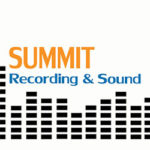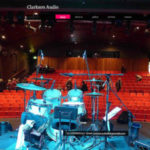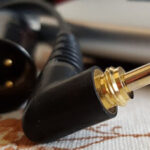Forums › Forums › CQ Forums › CQ General Discussions › CQ Sound comparison
- This topic has 13 replies, 7 voices, and was last updated 11 months, 4 weeks ago by
 Wildwind29.
Wildwind29.
-
AuthorPosts
-
2023/09/20 at 3:16 am #114985
Jeradachs
ParticipantHello A&H and friends
I try to figure out if I should buy a CQ20B new, or a used QU-SB. Both cost the same, and I can afford them.
It is not about features and functions, my needs are more than covered by both of them.
It is about sound! I cone from good Sounding analog Equipment an tried some digital mixing consoles in the same price range, with bad surprise about missing dynamics, harsh sound and latency.
I had two gigs with profi sound engineers using SQ5 and QU16 both in lovely sound quality, both over my budget limit and to big, to heavy.
Now CQ and QU-SB are in reach. But there is no comment about sound quality of CQ in the internet. No comparison by far.
So perhaps A&H can help me out. My criteria is:
Latency, warm sound quality, high musical dynamics, no noise (not using gates)
Besides the comparison between CQ and QU technology I would be glad to read about CQ vs UI24R or MR18. Cream on top.
Disclaimer: I am hated in several forums for this question because tons of experts tell me that there is no sound difference in digital Mixing consoles, or if there is, it is not relevant rompaired to the influences of the Parameters and other equipment in the sound chain. I have heared all theese comments but believe me I know better by experiance.
Again: which one is the better sounding Mixing console QU-SB or CQ20B
Thanks for help
Olaf
2023/09/20 at 10:01 am #114989 ScottParticipant
ScottParticipantI have a CQ20B but haven’t had it out in the field yet. I’ve only played with it in the shop. I can say that the SQ, Avantis, and dLive all sound fantastic, and there *is* a difference in sound between them and Qu and GLD (which I also have). Since the CQ is based on the same architecture, I am guessing that it should sound about the same as the SQ, Avantis, and dLive other than the preamp differences.
I have also compared Qu-Pac and the UI24R, using them both on a gig at the some location, and using the same speaker system, and the Qu-Pac sounds better IMO, with an overall warmer sound, whereas the UI was a bit “brittle” sounding for my personal likes. The UI24R sounds very similar to the X-Air. The Qu-Pac is basically the SB with a screen, some buttons, and a few other extras.
Based on my past experience with the other A&H 96K products, I would personally choose the CQ, unless you needed the added expandability of bus architecture (groups, DCAs, matrix, etc) and channel counts of the SB. Personally I don’t like mixing anything more than 16 channels on a tablet. With higher channel counts, I would much rather be on a physical console.
I am hoping to get the CQ out on a gig over the next few weeks. Based on what others have said already, I am confident that it is a great sounding mixer.
2023/09/20 at 10:10 am #114991 Lee7Participant
Lee7ParticipantI have used my newly acquired CQ20B on 3 shows now, and to my ears it sounds great. Obviously the user still has to be able to setup the EQ’s etc on channels and FOH to be able to get a good clear sound. I also own the QUSB which has done 100’s of shows with me. Out of the box and with similar eq settings to the QU, the CQ comes across with more mid range punch and crispness whereas the QU is a little warmer sounding. But so far I am very happy with the CQ. FWIW, I run an FBT Column line array, which consists of 6x 2×8″ (600w rms) subs and 6x towers (6x 4″ drivers and 4x 1″ tweeters – 450w rms).
🙂
2023/09/20 at 11:16 am #114993Jeradachs
ParticipantHey guys
Thanks a lot for the Answers. My band mates ask me to go for the CQ18T because of the completeness of the system.
As I am using the HK-Audio elements collumn additonalmids and hights can not be bad.
So as I need max 6 microphones, 2 guitars, bass, keyboard and the Looper the CQ12T would be satisfying for me. But the compfort of a built in Router is a strong argument for the CQ18T.
Personally I would prefere the stageboxdesign if the CQ20B, but in the end nothing is missing but 150€ when going with the 18T.
So a decision has to be taken.
Thanks for your Help
Olaf
2023/10/15 at 12:38 pm #115689Jeradachs
ParticipantDecision done: CQ20B only trouble, if Wifi fails, direct connection is nit possible because of toggle beteeen Ethernet and Wifi.
2023/10/15 at 11:47 pm #115717Hugh
ParticipantThe CQ is a quite remarkable mini desk with a boat load of automated features that will appeal to many users, however the question of sound quality deserves a bit of discussion. The two primary factors that control digital desk sonic quality are the core processor and it’s I/O (pre-amp & Converter) configuration. The QUsb features an older processor design that, like most all entry level digital desks, is limited to 48K sample rates. The CQ is offering a limited version of the A&H FPGA processor that delivers 24/96K performance. Digico was the first system I used that featured this 24/96K processing and it also featured their “D” pres that were a home run in my Digigrid/Waves project studio recordings. The sonic quality was significantly better than the QUsb so when the SQ5 was released in 2017 offering 24/96K processing I jumped on it.
However after auditioning the internal SQ pre-amps I added a DX168 expansion stage box to get a similar sonic quality to the digico “D” pres with the D-Live pres in the DX168. More than two years ago when the “Prime” 32 bit 96K I/O system was made available in a DX32 enclosure, I bit the bullet and have never looked back. In my acoustic Americana work sonic quality is extremely important for me!
Measuring the importance of differences in processing width and speed probably will not become a deal breaker with a CQ given it’s max channel count. But the fact that the internal I/Os are all you will be able to use could ultimately be less than satisfactory. There is no accommodation for either a DX168 or DX32 to be deployed for the detailed transparency their pres and converters offer. So the bottom line is carefully audition the CQ to ascertain whether or not it will fit your music genre needs: One thing is for sure, it’s price point is one hell of a good deal!
Hugh2023/10/16 at 8:43 am #115724robbocurry
ParticipantI know you’ve opted for the CQ20 – good choice! 👍🏻😃👍🏻
Just my tuppence worth as a QU/CQ owner:
Regarding sound – not features, the standout difference to me are the FX on the CQ.
To my ears, they are a major step up from the QU fx, especially the reverbs and delays.
Perhaps it’s because it’s fresh and not using my QU settings (which have evolved/degraded and transferred from unit to unit over almost 10 years) but there’s a perceived step up in clarity to my ears. It could just be the placebo effect or it could be all the new auto processing doing a better job than I ever could!!😃2023/10/16 at 9:31 am #115726 Lee7Participant
Lee7ParticipantI agree wholeheartedly with you have said re reverbs etc. Still a QU user and have been for almost 10 yrs. I was never fully happy with the reverbs on the QU, and by chance I was on a show over in Ireland were the engineer was using the older iLive. The iLive and QU shared the same effects engine, so I took screen shots of his reverb settings. An improvement on what I had achieved, but nowhere near as detailed as the plate reverbs in the CQ.
The CQ is a step up in my opinion, but just short of needing a pre delay option and the ability to eq the return to remove some of that low end mush and high end shrill.
2023/10/16 at 11:25 am #115735Hugh
Participantthe vast improvement of reverb and all FX applications is a direct benefit of the FPGA 24/96K processing, however the overall sonic shape offered in the CQ is pretty well determined with the fixed nature of the CQ pres and converters: either they will suffice or move up to a SQ5 with lots of better I/O options.
Hugh2023/10/16 at 1:42 pm #115740robbocurry
Participant@hugh
They’re definitely good enough for anything I’m doing right now:)2023/10/16 at 9:13 pm #115760Jeradachs
ParticipantHey guys
When I left the analog mixer world of my Dynacord Powermate it was because of the bad sounding FX ( digital ).
But the digital mixers I owned were worse. So by the time i heard a QU 16 and later a SQ5 I knew the price of real good digital mixers.
And then CQ appeared.
I read all comments of prof sound engineers, what you can not do with these little boxes, and I knew, as a musician, you will never need them.
A&H did agood job for musicians, and put a good price lable on it.
And when the FX is only hals as good, than you tell me. I‘ll be glad.
O thanks for your support. Hope to listen to this machine soon
Olaf
2023/12/27 at 11:30 pm #117866Monkee
ParticipantCan only agree the fx on my cq18t are a step up from what i found usable on my qu 16, especially the vocal reverb & delays. Mostly small gigs easily mixed with the cq.
2023/12/28 at 11:32 am #117877 Lee7Participant
Lee7Participant@Monkee,
I agree, but they could be better if we had the option of being to able to EQ the return and set pre delay etc. Although I don’t expect the latter to be added.
2023/12/29 at 9:04 am #117902 Wildwind29Participant
Wildwind29ParticipantBefore the CQ20B, I had the Soundcraft UI24R console for which I had reliability problems like other users concerning the microphone input preamplification card.
What I can say without having done A/B comparison tests is that the CQ20B has audio quality that is immediately felt both in live performance and in recording. It’s really appreciable.
I can’t say the same about the Soundcraft for which the reliability problems became apparent almost from the start of use.
-
AuthorPosts
- You must be logged in to reply to this topic.